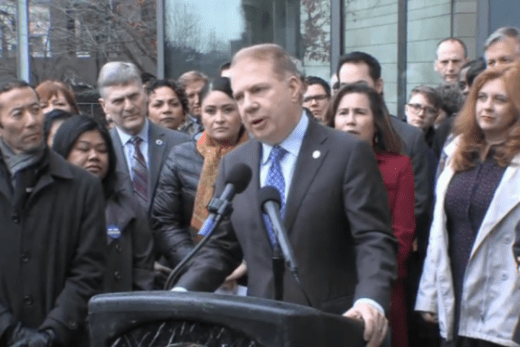With an executive order yesterday, Donald Trump followed through on his threat to punish "sanctuary cities," where local police do not report undocumented immigrants, by withholding federal grants.
The full implications of the order are uncertain. In New York, for instance, nearly $9 billion of the city's $85 billion budget comes from federal grants covering transportation, education, health care, and other priorities. But legal experts say Trump's authority to withhold funds would be limited to a narrow set of grants related to law enforcement.
Yesterday, mayors of sanctuary cities around the country made it clear that they are not backing down.
Stephen Fesler at The Urbanist passes on this statement from Seattle Mayor Ed Murray:
I want to assure Seattle residents that while they are right to be alarmed about President Trump’s divisive vision, they should not be concerned that this City will be bullied into stepping away from its commitments and values. The City of Seattle will continue to protect the rights guaranteed to the City and its people by the United States Constitution and will challenge any unconstitutional policies that threaten the security of our communities.
Trump may not have much leverage in these fights, Fesler says:
As far as possible federal funding that might be curtailed if Trump is successful in his anti-sanctuary city endeavor, it’s not clear how much is at stake in Washington. Under federal law, there must be a nexus between what federal funding would be allocated to a recipient for a specific use and what the recipient is failing to do. In this case, sanctuary cities like Seattle are generally not assisting the federal government in identifying undocumented and “illegal” immigrants nor housing them in jails if they do know that such person may be in violation of federal law. As a result, it’s generally understood that the only money likely at stake is federal funding related to law enforcement activities. For Seattle, that could mean a $10 million hit for policing. Other buckets of funding like housing assistance, healthcare, and transportation likely couldn’t be impacted. The irony of this though is that taking away law enforcement money won’t help end the supposed “carnage” that Trump claims to want stopped.
More recommended reading today: The Dirt, the blog of the America Society of Landscape Architects, digs into the new Global Street Design Guide from the National Association of City Transportation Officials. Seattle Bike Blog profiles an immigrant father who was killed riding his bike to one of his two jobs. And Transportation for America reports that Maryland Governor Larry Hogan is fighting efforts to make state government more accountable for its transportation spending.






